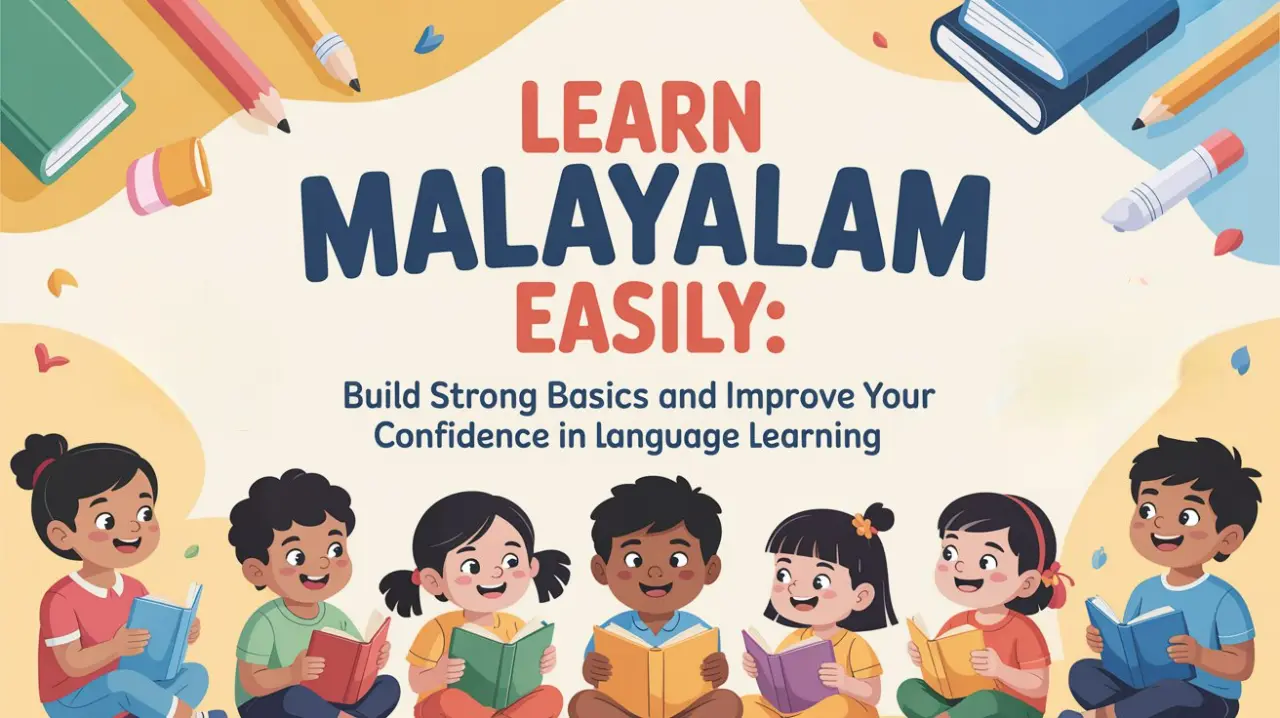Learn Malayalam Easily: Build Strong Basics and Improve Your Child’s Confidence in Language Learning




Language connects us, it helps children express themselves, bond with family, and understand their culture better. For many kids in Kerala and Malayali families outside Kerala, learning Malayalam can be a real challenge. Some struggle to read or write, while others feel shy to speak it fluently.
That’s where Interval Learning’s Malayalam Foundation Course steps in to help children learn Malayalam easily, build strong basics, and grow in confidence.
Let’s understand how to learn Malayalam the easy way, step by step using fun, structured, and practical methods that make language learning enjoyable.
Malayalam is more than just a subject; it’s part of our identity and culture. Yet, many children find it difficult to learn because:
Learning Malayalam doesn’t have to be hard. The trick is to start small, stay consistent, and follow a structured method. Here’s how your child can start:
Step | Focus Area | Description |
| 1 | Learn Malayalam Alphabets (Vowels & Consonants) | Begin with the 15 vowels (സ്വരങ്ങൾ) and 36 consonants (വ്യഞ്ജനങ്ങൾ). Practice daily with writing and pronunciation. |
| 2 | Recognize Sounds and Words | Match sounds to letters. Practice simple words like amma (mother), achhan (father), vellam (water). |
| 3 | Practice Writing | Write 5–10 words daily. Use copybooks or digital worksheets. |
| 4 | Learn Basic Grammar Rules | Understand gender, tense, and sentence formation through examples. |
| 5 | Read Short Stories or Poems | Reading builds vocabulary and helps pronunciation. |
| 6 | Speak and Listen Daily | Encourage conversations at home; listen to Malayalam songs or cartoons. |
| 7 | Revise Weekly | Repetition builds memory revise what you’ve learned each week. |
Learning Malayalam becomes easier when your child associates it with fun stories, songs, and games can make all the difference!
Here are the key basics of Malayalam that form the foundation for every learner:
Category | Malayalam Basics | Example |
| Alphabets | 15 vowels & 36 consonants | അ (a), ആ (aa), ക (ka), ഗ (ga) |
| Common Words | Family, Nature, Numbers | അമ്മ (mother), വെള്ളം (water), ഒരു (one) |
| Grammar | Gender, Tense, Sentence Structure | “ഞാൻ പോകുന്നു” = I am going |
| Pronunciation | Practice tongue position and rhythm | Malayalam has soft sounds like zh in “Kozhikode” |
| Writing Direction | Left to Right | Use lined notebooks for alignment |
Mastering these basics helps children move from confusion to confidence!
Many parents wonder, “Is Malayalam hard to learn?”
The honest answer? It can be challenging, but only without the right guidance.
Here’s why Malayalam seems tough at first:
With structured teaching, visual aids, and daily practice, it becomes much easier. At Interval Learning, we use creative visuals, phonetic practice, and step-by-step worksheets that help kids pick up Malayalam naturally.
In a few weeks, children start recognizing words, forming sentences, and most importantly speaking with confidence
Parents play an important role in supporting their child’s language journey. Here are simple ways to help at home:
Small, daily interactions make a big impact consistency is key.
At Interval Learning, we understand that every child learns differently. That’s why our Malayalam Foundation Course focuses on personal attention, practical teaching, and real-life language use.
Language is a gift giving your child strong Malayalam basics now will help them for life.
This Kerala Piravi (Nov 1–7), give your child the chance to learn Malayalam with ease and confidence. Interval Learning offers up to 20% off on our Malayalam Foundation Course for Classes 1–10.
Know more about this limited-time offer in the article below:
If your child finds Malayalam difficult or feels left behind, don’t worry Interval Learning is here to help. Learning Malayalam is not about memorizing words it’s about connecting with your roots, your people, and your identity. With the right guidance, any child can learn Malayalam easily and confidently.
At Interval Learning, we make Malayalam simple, fun, and meaningful for every child.
Our Malayalam Foundation Course is specially designed for beginners who need personal attention, simple teaching methods, and confidence-building support.
What You’ll Get:
Join hundreds of parents who trust Interval Learning to make Malayalam easy and joyful for their children.
Enroll today at Interval Learning's Online Malayalam Foundation Course and help your child fall in love with Malayalam again!
The best way to start is from the basics, learning the Malayalam alphabet, understanding pronunciation, and practicing simple words daily. Encourage your child to write short words and listen to Malayalam sounds regularly. Our Malayalam Foundation Course at Interval Learning provides a step-by-step, structured path that makes this journey simple and stress-free.
Not with the right method! With our visual learning and step-by-step teaching, kids find Malayalam easy and enjoyable to learn.
With regular practice and our course structure, most kids start reading and writing Malayalam comfortably within 2–3 months.
Yes! Use storybooks, Malayalam rhymes, and daily conversation practice. We also provide home assignments to support parents.
It’s a beginner-friendly course specially designed for children who struggle to read, write, or speak Malayalam confidently. The course focuses on strong basics alphabets, vocabulary, grammar, pronunciation through fun, interactive lessons that make learning natural and enjoyable.
Interval Learning offers personalized lessons, engaging content, and experienced Malayalam teachers. Our goal is to make every child confident in their language skills.
Yes, the foundation course covers all three—speaking, reading, and writing Malayalam through easy and fun exercises.
We conduct weekly tests and progress reviews, share performance reports with parents, and adjust the lessons based on individual needs. You’ll always know how your child is improving.
Yes! Apart from Malayalam, we offer foundation courses in English, Mathematics, Arabic, Hindi and french to strengthen your child’s overall academic skills.